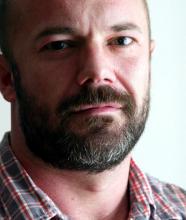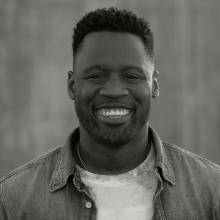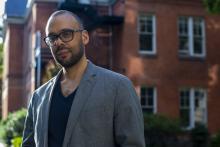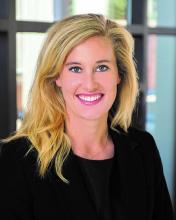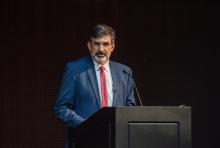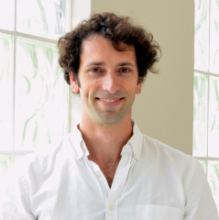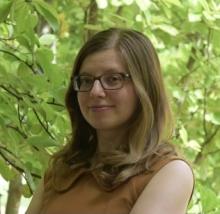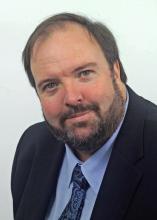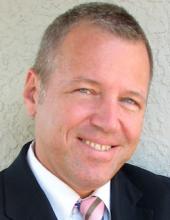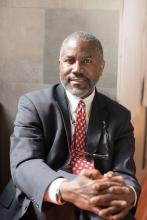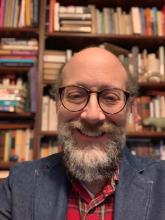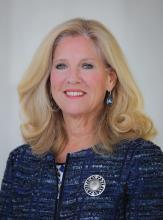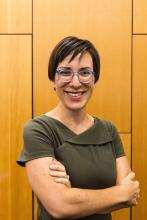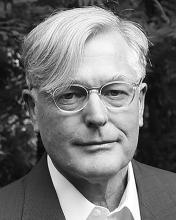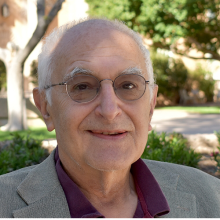The School of Civic and Economic Thought and Leadership welcomes more than two dozen speakers from universities and institutions across the country to share in a vital debate on this year's conference topic: Renewing America's Civic Compact.
Read more about this year's speakers and panels here. Still planning your trip to the conference? Visit our visitor information page.
Keynote speakers.
February 25, 9:30 - 10:15 a.m.
"We All Live on Campus Now"
Andrew Sullivan | Columnist, blogger at The Weekly Dish, and author
Remotely via Zoom
Why is our discourse so fraught with fear? Why do so many choose silence as the path of least resistance? And why are the core concepts of a liberal society under attack? In this presentation, journalist and media pioneer Andrew Sullivan will dig into campus orthodoxy’s impact on our broader culture — what began as campus habits and how they have permeated every facet of our culture and life. Additionally, he will discuss what we can do as individuals, leaders, and educational institutions to protect the ideals that are the bedrock of our nation. Sullivan will speak remotely via Zoom.
February 25, 5 - 6:15 p.m.
"The World We Want to Live In: Racism, Race and the Dignity of our Individuality"
Kmele Foster | Co-founder and executive producer at Freethink
In this lecture, which is also part of the three-event series “Can We Talk Honestly About Race?” co-founder and executive producer at Freethink Kmele Foster will discuss racism and the dignity of our individuality. He will argue that, if we value societal progress, placing truth and the dignity of individuals at the center of our public discourse is an urgent necessity.
The Washington Post columnist Karen Attiah will provide an alternative perspective for the future.
Panelists and moderators.
Musa al-Gharbi is a Paul F. Lazarsfeld Fellow in Sociology at Columbia University. His research explores how we think about, talk about, and produce knowledge about social phenomena including race, inequality, social movements, extremism, policing, national security, foreign policy and domestic U.S. political contests. His first book, We Have Never Been Woke: Social Justice Discourse, Inequality and the Rise of a New Elite, is under contract with Princeton University Press.
Helen Baxendale is the Director of Strategy and Analysis at Great Hearts K-12 Academies, a network of tuition-free schools delivering a classical liberal arts education to over 20 thousand students in Arizona and Texas. Prior to this, she was the Director of Academic Policy for the governing board of Arizona's public universities. Helen has a D.Phil in Public Policy from the University of Oxford. Her doctoral research and subsequent writings focus on the politics of American K-12 education.
Paul Carrese is the founding director of the School of Civic and Economic Thought and Leadership at Arizona State University. For nearly two decades he was a professor of political science at the U.S. Air Force Academy, and co-founded a new honors program blending liberal arts education and leadership education. He is author of "The Cloaking of Power: Montesquieu, Blackstone, and the Rise of Judicial Activism," and co-editor of three other books – on George Washington, constitutionalism, and American grand strategy. His most recent book is "Democracy in Moderation: Montesquieu, Tocqueville, and Sustainable Liberalism." He has held fellowships at Oxford University as a Rhodes Scholar; Harvard University; the University of Delhi (as a Fulbright fellow); and the James Madison Program, Politics Department, Princeton University. He serves on the advisory board of the Program on Public Discourse at University of North Carolina Chapel Hill.
J. Benjamin Hurlbut is trained in the history of modern biomedical and life sciences. His research lies at the intersection of science and technology studies, bioethics and political theory. He studies the changing relationships between science, politics and law in the governance of biomedical research and innovation in the 20th and 21st centuries. Focusing on controversy around morally and technically complex problems in areas such as human embryonic stem cell research and genomics, Hurlbut examines the interplay of science and technology with shifting notions of democracy, of religious and moral pluralism, and of public reason. He is author of Experiments in Democracy: Human Embryo Research and the Politics of Bioethics (Columbia University Press, 2017). He holds an A.B. from Stanford University, and a Ph.D. in the History of Science from Harvard University. He was a postdoctoral fellow in the Program on Science, Technology, and Society at Harvard Kennedy School.
Rita Koganzon is Assistant Professor (General Faculty) in the Politics Department at the University of Virginia. Her research focuses on the themes of education, childhood, authority, and the family in historical and contemporary political thought. Her research has been published in the American Political Science Review, the Review of Politics, and the History of Education Quarterly, as well as in several edited volumes. She also contributes book reviews and essays to the Hedgehog Review, National Affairs, The Point, and the Chronicle of Higher Education, among others. Her first book, Liberal States, Authoritarian Families was published by Oxford University Press in 2021.
Daniel J. Mahoney is Professor Emeritus and Senior Fellow at the Real Clear Foundation, and Senior Writer at Law & Liberty. For the 2020-2021 academic year, he was the Garwood Visiting Fellow in the James Madison Program at Princeton University. Among his many books are The Liberal Political Science of Raymond Aron (1992), De Gaulle: Statesmanship, Grandeur, and Modern Democracy (1996, 2000); Aleksandr Solzhenitsyn: The Ascent from Ideology (2001); Bertrand de Jouvenel: The Conservative Liberal and the Illusions of Modernity (2005); The Conservative Foundations of the Liberal Order (2011); The Other Solzhenitsyn: Telling the Truth about a Misunderstood Writer and Thinker (2014). His latest book, The Statesman as Thinker: Portraits of Greatness, Courage, and Moderation, will be released Encounter Books on May 10, 2022. He has edited and introduced writings of Raymond Aron, Aurel Kolnai, Bertrand de Jouvenel, Pierre Manent and Aleksandr Solzhenitsyn. He has also been executive editor of Perspectives on Political Science since 2017.
Michael Lind is a professor of practice at the University of Texas’ Lyndon B. Johnson School of Public Affairs. A graduate of the Law School at The University of Texas with a master's degree in international relations from Yale, Lind has previously taught at Harvard and Johns Hopkins. He has been assistant to the director of the Center for the Study of Foreign Affairs at the U.S. State Department and has been an editor or staff writer for The New Yorker, Harper's, The New Republic and The National Interest. A co-founder of New America, along with Walter Mead, Sherle Schwenninger and Ted Halstead, Lind co-founded New America's American Strategy program, and served as policy director of its economic growth program. He is a former member of the boards of Fairvote and Economists for Peace and Security. Lind has published in The New York Times, The Wall Street Journal, The Atlantic, Foreign Affairs, Foreign Policy, The International Economy and The Financial Times. He is the author of more than a dozen books of nonfiction, fiction, poetry and children's literature, including several that were New York Times Notable Books of the Year. His studies of U.S. history, economics and foreign policy include The Next American Nation (1995), The American Way of Strategy (2006), Land of Promise: An Economic History of the United States (2012) and The New Class War: Saving Democracy from the Managerial Elite (2020).
Paul W. Ludwig teaches at St. John's College Annapolis. His PhD is from the University of Chicago, Committee on Social Thought, and he has degrees from Oxford University and the University of Tennessee. He has held a visiting appointment in the Department of Government at Harvard University. He is the author of Eros and Polis (Cambridge, 2002) and Rediscovering Political Friendship (Cambridge, 2020).
Michael Pakaluk is the author of Aristotle’s Nicomachean Ethics, books VIII and IX (Oxford); Aristotle’s Ethics: An Introduction (Cambridge); and (with Giles Pearson) Moral Psychology and Human Action in Aristotle (Oxford). His anthology of philosophical essays on friendship, Other Selves (Hackett), has played a major role in the revival of the philosophical study of friendship. He has published in many areas of philosophy and the history of philosophy besides ancient philosophy, including the Scottish Enlightenment and John Henry Newman. Currently he is at work on a book on natural rights, and on the philosophy of music. Since 2011 he has been an Ordinarius of the Pontifical Academy of St. Thomas Aquinas. Pakaluk's avocations include golf, tennis, hiking, the French horn, espresso drinks and single malt scotch.
Dr. Paresky serves as Visiting Senior Research Associate at the University of Chicago’s Stevanovich Center on the Formation of Knowledge, Senior Fellow at the Institute for Humane Studies, and Senior Scholar at the Network Contagion Research Institute where she researches antisemitism and other forms of online extremism and disinformation. She writes for Psychology Today online where she often focuses on political polarization, viewpoint diversity, freedom of speech, and other related issues. She served as in-house editor and chief researcher for The Coddling of the American Mind by Greg Lukianoff and Jonathan Haidt. Her current project, Habits of a Free Mind: Psychology for Democracy, aims to develop a set of teachable practices and habits necessary for people to engage across lines of difference without feeling traumatized and without dehumanizing others.
Ian Rowe is a senior fellow at the American Enterprise Institute, where he focuses on education and upward mobility, family formation, and adoption. Rowe is also the co-founder of Vertex Partnership Academies, a new network of character-based International Baccalaureate high schools opening in the Bronx in 2022; the chairman of the board of Spence-Chapin, a nonprofit adoption services organization; and the co-founder of the National Summer School Initiative. He concurrently serves as a senior visiting fellow at the Woodson Center and a writer for the 1776 Unites Campaign.
Until July 1, 2020, he was CEO of Public Prep, a nonprofit network of public charter schools based in the South Bronx and Lower East Side of Manhattan. Before joining Public Prep, he was deputy director of postsecondary success at the Bill & Melinda Gates Foundation, senior vice president of strategic partnerships and public affairs at MTV, director of strategy and performance measurement at the USA Freedom Corps office in the White House, and co-founder and president of Third Millennium Media. Rowe also joined Teach for America in its early days. He has been widely published in the popular press, including in the New York Post, The Wall Street Journal, and the Washington Examiner. He is often interviewed on talk radio programs. He is also the author of a forthcoming book tentatively titled “Agency” (Templeton Press), which seeks to inspire young people of all races to build strong families and become masters of their own destiny.
Rowe has an MBA from Harvard Business School, where he was the first black editor-in-chief of The Harbus, the Harvard Business School newspaper; a BS in computer science engineering from Cornell University; and a diploma in electrical engineering from Brooklyn Technical High School (Brooklyn Tech), one of New York City’s elite public schools, which specializes in science, technology, and mathematics.
Charles T. Rubin teaches political philosophy at Duquesne University, Pittsburgh. Recent publications focus on converging technologies, and those who believe they should be used to redesign humanity, a topic he discusses in Eclipse of Man: Human Extinction and the Meaning of Progress (Encounter/New Atlantis Books, 2014). Dr. Rubin is working on a book exploring what classic stories about human created monsters tell us about the coming age of biotechnology.
Diana Schaub is Professor of Political Science at Loyola University Maryland, Visiting Professor of Political Theory in the Government Department at Harvard University, and a Visiting Scholar at the American Enterprise Institute. She was the Garwood Teaching Fellow at Princeton University in 2011-12. She is the author of a book on Montesquieu, along with many scholarly articles in the fields of political philosophy and American political thought. She is a coeditor (with Amy and Leon Kass) of What So Proudly We Hail: The American Soul in Story, Speech, and Song. Her new book on Lincoln’s statesmanship, His Greatest Speeches: How Lincoln Moved the Nation, appeared in 2021 from St. Martin’s Press.
Colleen A. Sheehan is a professor of Political Science at the School of Civic and Economic Thought and Leadership at Arizona State University. She has served in the Pennsylvania House of Representatives and on the Pennsylvania State Board of Education. She has been an Earhart Fellow, Bradley Fellow, Mary and Kennedy Smith Fellow, and Garwood Fellow at the James Madison Program of Princeton University. Sheehan is author of The Mind of James Madison: The Legacy of Classical Republicanism (Cambridge University Press, 2015), James Madison and the Spirit of Republican Self-Government (Cambridge University Press, 2009), Friends of the Constitution: Writings of the “Other” Federalists, 1787-88 (with Gary L. McDowell, Liberty Fund Press, 1998), and The Cambridge Companion to The Federalist (with Jack Rakove, Cambridge University Press, 2020). She has published in journals such as The American Political Science Review, William and Mary Quarterly, Review of Politics, and Persuasions: The Jane Austen Journal. Her current projects include The World of Emma Woodhouse (an interpretation of Jane Austen’s Emma) and “Madison’s America.”
Adam Seagrave is associate director and associate professor in the School of Civic and Economic Thought and Leadership at Arizona State University, as well as associate director of the Center for Political Thought and Leadership. He is the co-founder and co-director of the Race and the American Story Project, and Senior Fellow for Education with the Foundation Against Intolerance and Racism (FAIR). In his position with FAIR he is the lead author of the FAIR K-12 Pro-Human Learning Standards and is co-leading the development of the FAIRstory Curriculum built upon these standards. He served on the Executive and Steering Committees, and co-chaired the Political Science Task Force, for the Educating for American Democracy project from 2019-2021. He has published numerous articles for academic and popular audiences as well as three books, including The Accessible Federalist. He was awarded the American Legion National Education Award in 2021. Seagrave writes and teaches widely on topics relating to American political thought and history, with a particular focus on the relationship between racism and American historical ideals.
Suzanne Spaulding is senior adviser for homeland security and director of the Defending Democratic Institutions project at the Center for Strategic and International Studies (CSIS). She also serves as a member of the Cyberspace Solarium Commission. Previously, she served as Undersecretary for the Department of Homeland Security (DHS), where she led the National Protection and Programs Directorate, now called the Cybersecurity and Infrastructure Security Agency (CISA), managing a $3 billion budget and a workforce of 18,000, charged with strengthening cybersecurity and protecting the nation’s critical infrastructure, including election infrastructure. Ms. Spaulding has served in Republican and Democratic administrations and on both sides of the aisle in Congress. She was general counsel for the Senate Select Committee on Intelligence and minority staff director for the House of Representatives Permanent Select Committee on Intelligence. She also spent six years at the Central Intelligence Agency, where she was assistant general counsel and the legal adviser to the director’s Nonproliferation Center. She was executive director of two Congressionally-created commissions, on WMD and on terrorism. Following the attacks of 9/11, Ms. Spaulding worked with key critical infrastructure sectors as they reviewed their security posture and advised the CEOs of the Business Roundtable. In 2002, she was appointed by Governor Mark Warner of Virginia to the Secure Commonwealth Panel to advise the governor and the legislature regarding preparedness issues. She was managing partner of the Harbour Group, a principal in the Bingham Consulting Group, and of counsel to Bingham McCutchen LLP.
In addition to her work at CSIS, Ms. Spaulding currently serves on a number of corporate boards and advisory boards, and is a member of the Homeland Security Experts Group (HSEG).
Karen Taliaferro's research interests include ancient and medieval political philosophy as well as religion and politics, with a particular emphasis on Islamic thought. Her 2019 book, "The Possibility of Religious Freedom: Early Natural Law and the Abrahamic Faiths" examined the perennial conflict of divine law and human law, proposing a re-examination of ancient and medieval traditions of natural law to mitigate the conflict. Dr. Taliaferro's education includes a B.A. in Political Science and French from Marquette University and an M.A. and Ph.D. in Government from Georgetown University, as well as additional training in classics from Northwestern University. She has previously taught humanities and Great Books at Villanova University and has held research fellowships at the James Madison Program at Princeton University, as well as Georgetown University's School of Foreign Service in Doha, Qatar. Taliaferro was awarded a 2011 NSEP/Boren grant for Arabic studies and research on human rights curriculum in Morocco. Prior to her academic career, she served as a Peace Corps Volunteer from 2006-2008 in rural Morocco, focusing on health education and development training.
Prof. C. Bradley Thompson is professor of Political Science at Clemson University and the Executive Director of the Clemson Institute for the Study of Capitalism. His research interests focus on the history of political thought and the American founding. He is the author most recently of America's Revolutionary Mind: A Moral History of the American Revolution and the Declaration that Defined It.
Michael Zuckert (BA, Cornell University; PhD, University of Chicago, 1974) is the Thomas W. Smith Distinguished Visiting Scholar at the School of Civic and Economic Thought and Leadership at ASU and the Nancy Reeves Dreux Professor of Political Science at the University of Notre Dame, Emeritus, and founding editor of the Journal of American Political Thought. He has published extensively in the areas of early modern political philosophy and American political thought. His most recent book is co-authored with Catherine Zuckert, entitled Leo Strauss and the Problem of Political Philosophy. He has a forthcoming book, A Nation so Conceived: Abraham Lincoln and the Paradox of Democratic Sovereignty.

